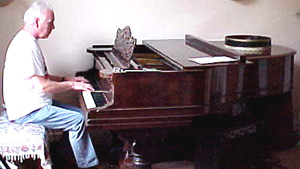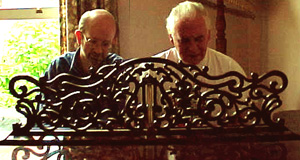
Procol HarumBeyond |
|
|
PH on stage | PH on record | PH in print | BtP features | What's new | Interact with BtP | For sale | Site search | Home |
|
Sunday 2 July, 2000, and Gary Brooker declares his intention to 'sing for his supper', although the meal he's just eaten with us was lunch, if not breakfast, and of course no recompense is required. He migrates into our front room where Linda's young pupils have been at their music lessons all morning and having given his attention to some Chinese woods, sounding them by tapping with his pipe allows his hands to find their way across the Steinway keys. His touch is rhythmic, authoritative, with the left hand maintaining sturdy, melodic basslines but it's mostly discontinuous snippets that he plays rather than whole songs: we're being treated to a mildly-self-deprecatory demonstration of the Brooker compositional techniques.

'Here's one I nicked from MacDowell ' He summons the start of To a Wild Rose from the memorial residue of some distant piano-lesson and sings over it ''She wandered through the garden fence " A chuckle, and the song breaks off. Roses, gardens of course, of course
'What's this one, then, Roland?' he challenges, forcefully laying down three chords, the third one topped with a violent dissonance.
'Sounds like the start of Pandora's Box,' I offer doubtfully, with the flattened fifth in mind. But no, it's a chunk of Holst's Mars and he thumps out the characteristic rhythm to make the point. 'Kaleidoscope,' he grins. Of course: that gruesome final chord, I see it all now.
That piano rhythm brings him to the instrumental middle of Rambling On, though I never get to learn what else, if anything, that passage was inspired by. Gary agrees that he could 'never leave that rhythm alone' it's there under Piggy Pig Pig and of course it's the basis of the Morse-code guitar at the start of Shine on Brightly. Suddenly he's playing that song, with me supplying Matthew Fisher's fabulous organ parts as best I can at the top of the piano keyboard. The sax of Frank Mead (who had been experimenting earlier with our bodhrán) stays in its case, and Albert Lee (who had previously played some excellently nimble piano) remains untempted by the various fretted instruments in the offing but it's great stuff just with piano and voice, and we get right the way through the whole song too.
'Here's another thing I stole' he declares, picking out a see-sawing motif, first in one key and then in a more familiar B flat, asking if I recognise it. 'Well-Tempered Clavier, book one, Prelude 21,' I reply no great smartness here, it's simply one I learnt for a piano examination long ago.
Gary smiles a moment, not so much at this prompt recognition, but at my overlooking its Procoholic implication.
'Listen,' he says, this time collapsing the demi-semiquavers into block chords. Straightway I recognise a chord sequence that I'd heard him play on the piano during the orchestral rehearsals before 1996's Barbican recital. I thought it was the basis of the opening of Fires (Which Burnt Brightly) and I said so. No reply, but Gary breaks into Learn to Fly, admittedly not a song I've ever tried to play at the piano. The sung words of the title fit precisely over Bach's chords, and later on I realize Bach has supplied the introduction also, albeit transposed from B flat up into D. Kick-yourself time, I think. Amazing to discover that such an upbeat, raucous song has its harmonic origins in something so delicate, from so long ago. [Read an interview in which GB talks about his Bach-inspired compositional method]

Next we get a blast of Fires, though it peters out as Linda suggests we should be setting off for the Colston Hall. Yet Gary starts several more songs and we muster a final duet of Grand Finale, including a very tasty variant chord (a sharpened third on the third beat in Gary's part!), which resounds across the neighbourhood through the open window.
Even after that's died away I find myself bashing out The Dead Man's Dream, with Gary singing along as he heads for the hallway. He agrees that the descending opening is reminiscent of the start of A Salty Dog, and doesn't disagree when I insist these are the best set of chords most unmistakably Procolian in their Gothic bite he's ever come up with. He leaves for the front door, still searching vocally for a tombstone.
From the car Gary contemplates Bristol's northern suburbs with approval: 'Lots of character, here. Is this all local rock?' I start up about Brandon stone and Cotham landscape marble, waving towards the districts where I was born, and where I work.
'This your manor, then,' he concludes. 'So when did your family escape from Putney?' I'm suitably baffled by this apparent feat of clairvoyance, until he reminds me that there's a photograph hanging in the room where we ate, showing William Clare with Frances Jane his wife in 1885 with their twelve children. I hear my voice explaining how these forebears moved away from London, but an inner voice is nagging ever louder: how can I have played that elaborate Grand Finale counterpoint correctly a hundred times on my own, yet I go and fluff a handful of notes when I get the chance to play it with Maestro Brooker?
As we near the centre of Bristol I eventually bewail this musical failing, aloud.
'But ... that's the story of our lives,' Henry Spinetti comments from the back seat: in a way the most reassuring remark I've ever heard from a musician. And suddenly it's handshakes all round and the loading bay of the Colston Hall, where I last saw Brooker playing in 1977, has swallowed all our visitors up and it seems as though life is going back to normal
Until the gig itself
|
More Brooker / Rhythm Kings information here |
|
PH on stage | PH on record | PH in print | BtP features | What's new | Interact with BtP | For sale | Site search | Home |